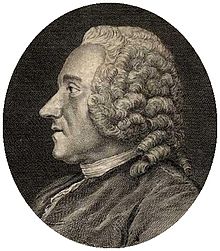Louis-René de Caradeuc de La Chalotais
Louis-René de Caradeuc de La Chalotais (born March 6, 1701 in Rennes , † July 12, 1785 in Rennes) was a French lawyer.
politics
La Chalotais was Procurator General of the Parliament of Brittany for sixty years . He was an ardent opponent of the Jesuits . In 1761 he drafted a memorandum for Parliament on the Constitutions of the Order, which contributed greatly to their suppression in France. In 1763 he published the remarkable Essai d'éducation nationale , in which he proposed a program of scientific studies to replace those taught by the Jesuits. In the same year the conflict between the estates of Brittany and the governor of the province, the Duke Aiguillon, began. The estates refused to agree to the extraordinary levies demanded from Aiguillon on behalf of the king. La Chalotais was a personal enemy of Aiguillon, and when the Parliament of Brittany sided with the Estates, he took the lead in his opposition. Parliament banned the collection of taxes without the consent of the estates. The king repealed these decrees, whereupon all but twelve members of parliament resigned (October 1764 to May 1765). The government considered La Chalotais to be one of the initiators of this affair.
At this time Louis Phelypeaux (1705–1777), State Secretary responsible for provincial affairs , received two anonymous and insulting letters. La Chalotais was suspected of having written it and three manuscript experts confirmed its authorship. The government therefore arrested him, his son and four other members of parliament. The arrest became a public scandal and there was much talk of "despotism". Voltaire alleged that the procurator in his Saint-Malo prison had been humiliated into writing his defense with a toothpick dipped in vinegar for lack of ink. Apparently this was pure legend, but public opinion throughout France was persistently aroused against the government. On November 16, 1765, a judges commission was appointed to take over the process. La Chalotais considered the trial illegal; as Procurator General, he claimed the right to have a hearing in the Parliament in Rennes , or otherwise in the Parliament of Bordeaux , according to the customs of the province. The judges did not dare to pronounce a verdict based on handwriting analysis, and nothing had moved by the end of the year.
Louis XV then opted for a sovereign act and brought the matter to his council, which decided, without further formalities, to exile the accused. This stopgap only exacerbated public agitation; Philosophers, members of parliament, patriotic Bretons and Jansenists unanimously proclaimed that La Chalotais had become the victim of the personal hatred of the Duke of Aiguillon and the Jesuits. The government finally gave in and agreed to recall the resigned members of the Brittany Parliament. When Parliament convened again, after a formal charge of Aiguillon, it demanded the recall of La Chalotais. This was granted in 1775 and La Chalotais was allowed to hand over his post to his son.
In this affair, public opinion turned out to be stronger than the king's absolutism. It contributed greatly to the opposition to the king's power and can be considered a prelude to the revolution of 1789 . La Chalotais, who was personally a heated, haughty and unsympathetic character, died in Rennes in 1785.
Web links
| personal data | |
|---|---|
| SURNAME | La Chalotais, Louis-René de Caradeuc de |
| BRIEF DESCRIPTION | French lawyer |
| DATE OF BIRTH | March 6, 1701 |
| PLACE OF BIRTH | Rennes |
| DATE OF DEATH | July 12, 1785 |
| Place of death | Rennes |
